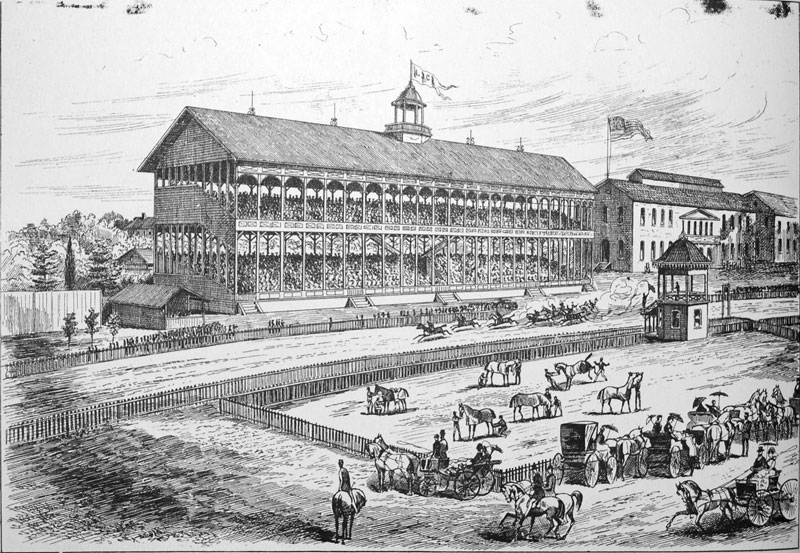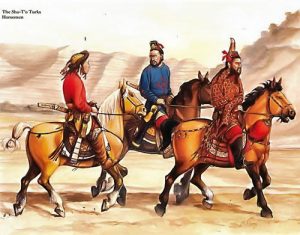Horse racing in North America began almost as soon as Europeans settled the colonies. The first racetrack, called the New Market, was established in 1665 near the site of the present-day garden city of Long Island in New York. Tracks rapidly developed wide appeal among the citizens, and horse racing spread along the Atlantic Coast quickly.1 By the time of the American Revolution, horse racing had already become popular in almost every colony. Moreover, it was moving well into the newly settled areas of the Southwest. Andrew Jackson was a founder of the first racing track in Nashville, Tennessee, in the early nineteenth century. By the 1800s, Kentucky had eight racetracks, due to its native bluegrass being recognized as ideal for grazing horses.2

Horse racing becomes much more important when we analyze life in early American society. Like almost everything else in the life of early America, the world of horse racing was separated by strong lines of class and race.3 For many years, it was considered the exclusive enjoyment for the rich gentleman. In 1674, a court in Virginia gave a fine to James Bullock, a tailor, who proposed a race. It was against the law for a laborer to make a race, and according to the court, horse racing was a sport exclusive to only rich gentlemen. While aristocrats retained control of racing, they were not the only people who participated. Southern aristocrats often trained young male slaves as jockeys for their horses, and northern horse owners employed the services of free blacks as riders. In America, African Americans eventually emerged as some of the most talented and experienced trainers of racing horses. Horse racing became very popular among the public. Despite social and legal pressures, free blacks and poor whites often staged their own informal races.4
Racing also reflected the growing sectional rivalry between the North and the South. In 1824, the Union Race Course on Long Island established an astounding $24,000 prize for a race between two famous thoroughbreds: American Eclipse from the North, and Sir Henry from the South. Surprisingly, the race between Eclipse and Sir Henry was America’s first national event.5 Eclipse won two of the three heats, but Sir Henry prevailed in another such celebrated contest in 1836. These intersectional races, which drew enormous crowds and created tremendous publicity, continued into the 1850s, until the North-South rivalry began to take a deadly turn.6

Horse racing remained popular after the Civil War, but two major developments changed its character considerably. The first development was the successful effort to drive African-Americans out of the sport. At least until in the 1890s, black jockeys and trainers remained central to racing. At the first Kentucky Derby, in 1875, fourteen of the fifteen horses had African American jockeys. Isaac Murphy, a black man, won a remarkable 44 percent of all races, including three Kentucky Derbies. Gradually, however, the same social dynamics that enforced racial segregation in so many other areas of American life penetrated to horse racing as well. By the beginning of the twentieth century, white jockeys and organized jockey clubs had driven almost all black riders and many black trainers out of the sport.7
The second change was the introduction of formalized betting in the sport. In the late nineteenth century, racetracks began creating betting systems to lure customers to the races. Race horses were moving into the hands of enormously wealthy families, and the audience for racing was becoming increasingly working class and lower middle class. The people who now came to tracks were mostly white men, and some white women, who were lured to the races not by the love of horses, but by the usually futile hope of quick and easy riches through gambling.8
As soon as the horse racing ideology was offered to the American society, the public showed great affection. Horse racing has become known as one of the most popular sports in America. Over time its development exposed the changes American society has gone through. Horse racing is still popular in America today, so popular in fact that a three famous races, the Kentucky Derby, the Preakness Stakes, and the Belmont Stakes, known together as the Triple Crown, are still held every May and June.
- Alan Brinkley, American History: Connecting with the Past Volume 2, 15 edition (New York: McGraw-Hill Education, 2014), 156. ↵
- Richard Locker, “Will horse racing and betting make a comeback in Tennessee?” Commercial Appeal, accessed December 6, 2016, http://archive.commercialappeal.com/news/government/state/will-horse-racing—-and-betting-on-them—-make-a-comeback-in-tennessee-327f1df7-521b-7209-e053-010-379234621.html. ↵
- Brinkley, American History: Connecting with the Past Volume 2, 15 edition, 156. ↵
- Brinkley, American History: Connecting with the Past Volume 2, 15 edition, 156. ↵
- Henry Cecil, The Racing Post: A Great Knight (London, Business Insights, 2011), 2. ↵
- Cecil, The Racing Post: A Great Knight, 2. ↵
- Brinkley, American History: Connecting with the Past Volume 2, 15 edition, 156. ↵
- Brinkley, American History: Connecting with the Past Volume 2, 15 edition, 156. ↵



77 comments
Maricela Guerra
I think this topic was very creative, the author went into a approach that no other has gone before. I still can’t believe that there was still a problem with race. He provided a lot of information that made the article interesting enough to keep reading. Also not too informational to where it seemed like a report. Other than that this article executed very nicely.
Christopher King
Horse racing is possibly one of the oldest sports in the United States. I enjoyed this article due to the fact that it went to the beginnings of horse racing and how a sport for rich white mens amusement was operated and trained by African Americans. The fact that they had trained the horses and rode them well enough only to get forced out of the sport for some time due to race is ridiculous. Unfortunately, that’s the way of our cultures past. This article was well written and gave detailed information on the time period and start of the sports popularity.
Miranda Alamilla
It’s interesting to read about how horse racing came to be in America considering my dad was a horse trainer for many years and horses have always been a big part of my life. However, I thought it was a bit odd to read that horse racing was more of a rich mans sport – but I guess horse racing is used now to place a large amount of bets so I can see where it came from. It’s nice to know that it is still a part of Kentucky life and hopefully, they never lose their horse racing pride.
Rafael Lopez-Rodriguez
It is very interesting to learn on how horse racing gained popularity as a sport. Reading about the barriers this sport faced did not surprised me yet this early era is known for only people of high class and of a specific race to participate in any sport. Although it has become quite popular this sport, it is known for betting but I find it interesting on the history of horse racing. Great article!
Samuel Stallcup
I remember going to a horse race one time when I was younger, and I have no recollection of how it operated and what it was for. I found it interesting that poorer people were not allowed to even suggest or a start a race, it was only an act for rich men. I also thought it was interesting that people started horse racing so soon after the colonies were established. Nice article.
Rebekah Esquivel
I don’t really know much about horse racing at all. This article did a very good job on describing the sport and where it came from. I found it super interesting that the first jockeys in the Kentucky Derby were almost all African Americans. As almost every sport has African Americans being implemented last this was very surprising to see. I really enjoyed reading this article and learning about the horse racing.
Ashley Tumlinson
This was a very well-written, interesting article! The detail you used to describe horse racing in depth was beautifully written. I would have not guessed the particular detail of African American men being the first jockeys. The sport is in fact associated with the upper-class, I would not have assumed this at that particular point in time. it is beautiful to know that horse racing is still a huge part of the Kentucky life. I would definitely love to experience a race live one day!
Alejandra Chavez
I find it amazing how a sport caused such a social uprising that it had to be taken through a court system but in the first Kentucky Derby had 13 black jockeys out of 14 total jockeys. Despite its rough beginnings, I’m glad that the sport stayed strong to where I was able to go see some races growing up. This was a very well written-informative article.
Cherice Leach
It’s crazy that something so simple like horse racing could be defined in economic and social ways. I never knew that horse racing was first made up by the aristocrats and that the poor or laborers could not impose a race. It’s also interesting to note that African Americans were the first and best trained horse riders for these events. Especially because some of them were forced to do this because they were slaves.
Justin Garcia
This is a very well developed article. It details the beginnings of horse racing in the U.S in a brief yet informative manner. The article also does a great job of illustrating the appeal of horse racing to a general audience. I also enjoyed that this article talked about obscure facts such as the first Jockeys in horse racing. Overall this is a well developed article that provides great detail about it’s topic.